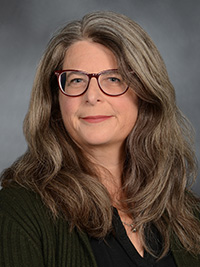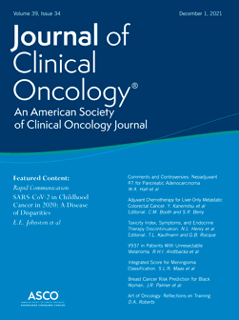Tracking SARS-CoV-2 in Children with Cancer
Dr. Jennifer Levine
While children were considered to be less vulnerable to COVID-19, Jennifer M. Levine, MD, MSW, a pediatric hematologist-oncologist at NewYork-Presbyterian Komansky Children’s Hospital, knew it was important to raise the question about COVID-19 infections in children with cancer sooner rather than later. Early on in the pandemic, Dr. Levine voiced her concerns in a pediatric hematology/oncology Facebook group, receiving an overwhelming response. She and six collaborators from similar programs across the country quickly began developing a formal registry to track the effects of SARS-CoV-2 in childhood cancer. “It was unusual to have a project originate through Facebook. Our members participated because they felt the urgency of the issue,” says Dr. Levine. At her suggestion, the newly formed team of pediatric hematologists-oncologists, co-led by Dr. Levine and Emily Johnston, MD, and Julie Wolfson, MD of the University of Alabama at Birmingham, created a registry as their starting point, collecting data via REDCap Cloud on nearly 1,000 children from 94 institutions across 36 states. The resulting Pediatric Oncology COVID-19 Case (POCC) Report registry became the country’s largest data source of children with cancer and SARS-CoV-2 at that time. POCC provided an invaluable resource to pediatric oncologists who were already beginning to see children and adolescents with cancer diagnosed with COVID-19 but with little understanding on how to treat them.
Creating a national registry of SARS-CoV-2 in children with cancer early in the pandemic enabled the study team to provide colleagues in hematology/oncology with regular snapshots of the emerging clinical course of this disease.
“SARS-CoV-2 in Childhood Cancer in 2020: A Disease of Disparities,” was the featured content article in the December 1, 2021, issue of the Journal of Clinical Oncology
Their observational study covered a period from the onset of the pandemic through February 19, 2021. The researchers compared demographic and clinical characteristics of 917 children receiving cancer therapy and infected with SARS-CoV-2 to SEER-reported population-level pediatric oncology data. The data revealed a number of findings, including:
- Hispanic or Latino and publicly insured children with cancer and COVID-19 were overrepresented in the study cohort compared to the general population of children with cancer (43.6 percent vs. 29.7 percent, and 59.3 percent vs. 33.5 percent, respectively)
- Publicly insured children, children with hematologic malignancies, and those with low white blood cell counts were at increased risk for hospitalization
- Cancer therapy was more likely to be modified in Hispanic children with COVID-19 even when they didn’t necessarily have a more severe disease course
The study provided pediatric oncologists with a resource for real-time information about which children with cancer were more likely to get COVID and guidance in determining their clinical course, including factors associated with the development of severe symptoms and when to modify cancer therapy and/or consider monoclonal antibody therapy.
Facing the Decision to Delay Cancer Treatment
One of the most challenging decisions confronting pediatric oncologists at the onset of COVID-19 was whether to continue time-sensitive anticancer therapies in cancer patients diagnosed with Sars-CoV-2. Early in the pandemic, this issue was explored by pediatric oncologists at NewYork-Presbyterian/Columbia University Irving Medical Center, NewYork-Presbyterian/Weill Cornell Medical Center, and Memorial Sloan Kettering Cancer Center in a retrospective study that shed light on the ramifications and factors that should be considered when determining the course of care for these patients.
“Research has shown us that respiratory infections in children who are chronically ill or whose immune systems are compromised have worse disease and higher rates of mortality than their well peers,” says Dr. Jennifer Levine. “With this in mind as we faced an unknown virus, we needed to be thoughtful about when to intervene and when to hold therapy for children who are asymptomatic. The substantial volume of pediatric oncology patients cared for by our three programs in an early epicenter of COVID provided a meaningful opportunity to assess what we were reckoning with.”
The study, published in Pediatric Blood & Cancer, involved an exhaustive review of EMR data on demographics, presence of COVID-19 symptoms, complete blood counts, inflammatory markers, imaging, hospital course, and impact on cancer-directed therapy. Confirmation of COVID-19 was defined as a positive result by reverse transcriptase polymerase chain reaction on a nasopharyngeal swab specimen, and only laboratory confirmed cases were included. Of the 174 patients undergoing testing for COVID-19, 19 tested positive – 3 patients had nonmalignant hematologic diagnoses, 14 had cancer, and 2 patients had undergone allogeneic hematopoietic cell transplantation. Among the 19 patients, the majority had relatively mild disease and almost half could be treated as outpatients or without the need for respiratory support. Overall:
- 16 patients (8 percent) were symptomatic
- Fever (68 percent), cough (47 percent), and dyspnea (37 percent) were the most common symptoms
- 11 patients were hospitalized and generally admitted for expected complications of cancer therapy rather than complications of COVID-19 disease
- 4 patients (21 percent) required supplemental oxygen and 2 (11 percent) required mechanical ventilation
- Only 3 of 19 patients (16 percent) received COVID-19-directed therapy
While nearly two-thirds of patients experienced cancer treatment delays, the authors note that this was due to decisions to defer planned treatment rather than directly to complications of COVID-19 infection. Based on their study’s data, they suggest “that in patients without underlying comorbidities beyond their cancer diagnosis, COVID-19 may not pose a significantly greater threat than other intercurrent viral infections and that asymptomatic patients whose anticancer therapy cannot be delayed may be able to safely receive myelosuppressive chemotherapy with close monitoring and follow-up.”
Filling the Gap in Fellowship
The COVID-19 pandemic has also had widespread effects on the medical education of trainees, with fellows being disproportionately affected. Suspended surgeries, closed clinics and labs, and additional duties related to COVID left many fellows finding it difficult to meet case volume requirements for board eligibility. Opportunities for connecting with their peers, mentors, and colleagues – both at their institution and through medical conferences – disappeared. In an effort to mitigate these effects, Dr. Levine, along with colleagues from five other centers in the New York area, created a collaborative educational series for pediatric hematology, oncology, and stem cell transplantation fellows.
The virtual-Symposium of Pediatric Hematology/Oncology of New York (v-SYMPHONY) was co-founded by Dr. Jennifer Levine and Prakash Satwani, MD, a pediatric hematologist-oncologist at NewYork-Presbyterian/
“Creating this unique community out of the COVID crisis was an acknowledgement of residents and fellows who lost their social interactions,” says Dr. Levine. “This group collaboration really blossomed and brought together physicians from all over the region.”





